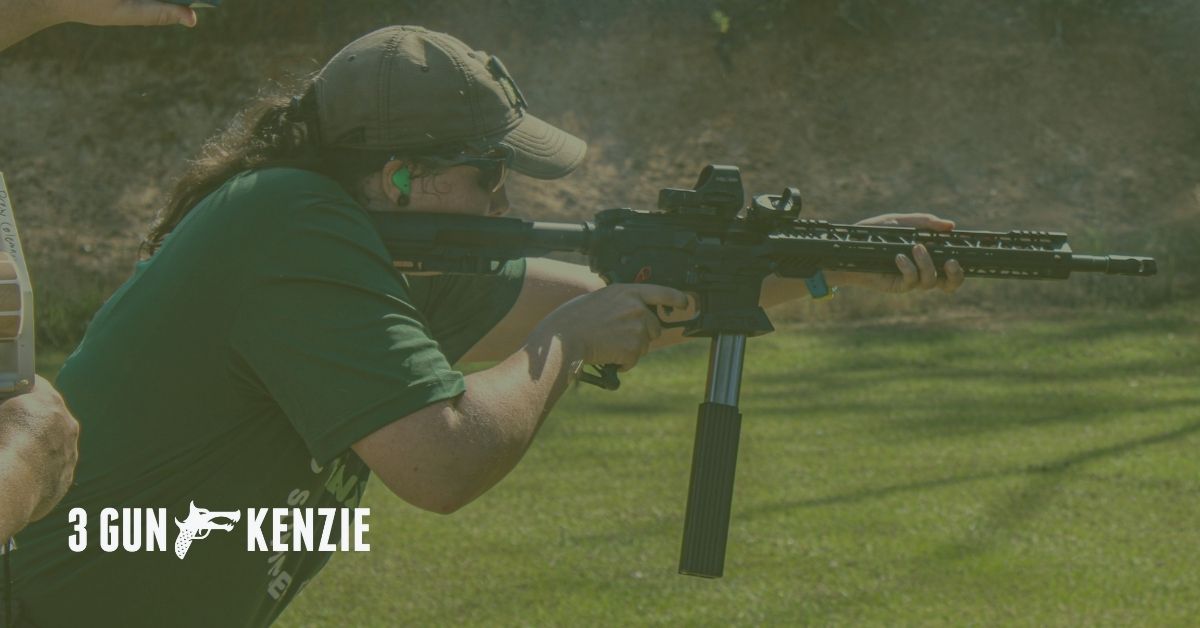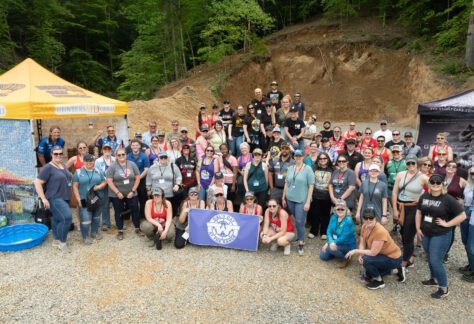Many people ask me about shooting sponsorships throughout the year, and I give everyone much of the same advice. There is one golden rule to live by if you want to be sponsored in any sport or activity you do, give more than you ever expect to receive. If your first question is “What’s in it for me?” you don’t have the right mindset even to ask sponsors for support.
10 Ways to Add Value to Companies:
1. Be a customer first
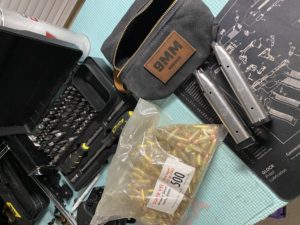
I was a customer of Super Vel, Run Gun Industries, & Atlas Gunworks before they sponsored me
The worst thing you can do is ask a company for sponsorship when you’ve never actually bought their product. It’s disingenuous to expect them to support you when you’ve never supported them. Leave the company reviews online, follow them on social media, and sign up for their email newsletter. You should be their biggest fan!
2. Believe in & use the product
There is no way to give genuine recommendations about a product if you don’t use it or like it. Companies can tell when you don’t know their product line, and they can see in videos, pictures, and even in person whether or not you use their products. It is even more authentic if you exclusively use their products and maintain loyalty to their brand.
The best shooting sponsorships are when the company and shooter work together to innovate new products, test prototypes, and build together. You want to work with companies who listen to feedback, and they want to work with shooters who are out there running and gunning in different environments. Essentially, you’re a team with the same goal of increasing exposure and growing your brand and theirs.
3. Let others try & borrow the product
The entire point of shooting sponsorships is to introduce products to people who have never seen or used them before. The best way to increase exposure and add value to a company is to allow other shooters, friends, and family to try out the company’s products. You as a shooter can reach more people in person than a brand can. Plus, there aren’t many opportunities for people to try a product out before purchasing. You can’t put a price on creating new loyal customers for the brands you represent.
4. Create honest content & tag them

I fell in love with Invictus Practical and have been loyal to their caddies ever since!
People can smell a sales pitch a mile away. Create content that focuses on what you love about the product, how you use it, and what it has done for you, without ever mentioning the cost of it or forcing a sale. This goes back to being genuine about owning and using the products. Captivating content will create interest for someone to learn more through the company’s tagged profile, website, a link in your bio, or even by Googling the company name. People are resourceful, but be sure to tag the company on the photo, in the caption, and mention how they can find a link to learn more.
5. Share the company’s social media posts
This is by far the one task that takes the least effort yet is rarely performed. When you share a company’s post, make a repost, or add a post to your Instagram & FB stories, you’re increasing the brand’s online reach exponentially. And, with the way shadowbanning is happening these days, every single share goes a long way. Similarly, social media platform algorithms are constantly changing. Liking and even engaging on a company’s post (even if it’s just dropping an emoji) can help boost the post’s exposure to others online. If you want to go the extra mile, write comments that are meaningful, educational, or that allow for further commentary. Tag your friends on the company’s posts and reply to other comments positively. Every little bit helps, and company’s do notice these small but mighty actions.
6. Give back to the sport/volunteer

Volunteering as an RO
If you don’t know by now, there is hardly any money to be made in the shooting sports, and most matches are volunteer-led. What do you have to give back to the sport you love so much?
Donating your time by setting up or breaking down your local matches can go a long way in your community. Go work as an RO at the closest Sectional or Area match near you. If you have more time than others, volunteer to help RO a Nationals event. Match directors are always in need of range masters, stage designers, vendor and sponsor coordinators, and more.
If you can’t give your time, consider making a monetary donation or donating excess product a company gives you to your local club or a prize table. If you work for a company that provides services a shooting club or major match could benefit from, consider connecting them with the match director.
Another way to give back is to bring new competitive shooters to the sport, mentor junior shooters, or do your best to pay it forward. The only way the sport will grow is if we do our part to build it up. Consider yourself all in at this point. Once again, there is nothing too small to make an impact.
7. Travel and compete in Sectional, Area, National, and other major competitions
When you are first getting started, spend at least a year in the circuit before going out asking for shooting sponsorships. Exposure at a local level is good, but companies want to see you traveling and competing at higher-level matches. Many companies do not expect you to go out and place, but they do expect you to expose their products and brand to people you haven’t met or shoot with all the time. One of the reasons companies sponsor shooters is, so they don’t have to travel to matches to educate people on their products. Companies can be selective in supporting shooters in different disciplines to expose their products to the most people across the country (and some across the globe).
 As you travel to more significant matches, you will meet people who work in the industry. At National level competitions, you can meet and talk to Marketing Directors, Director of Sales, and higher-ups in the companies tabling at the event. You also have opportunities to meet current shooting team members at these events, and if scheduling permits, watch them shoot as well. It’s easy to get lost in wanting a jersey of your own, but you have to stop and think about the amount of time and effort current sponsored shooters have put into this sport. It’s all about building relationships at events. It’s fun and comfortable to shoot with your friends or local buddies, but squadding with a complete set of strangers can turn out to be one of the most fun and beneficial experiences for you. This industry is a lot smaller than you think. The more people you know and connections you make, the better set up you’ll be in the future.
As you travel to more significant matches, you will meet people who work in the industry. At National level competitions, you can meet and talk to Marketing Directors, Director of Sales, and higher-ups in the companies tabling at the event. You also have opportunities to meet current shooting team members at these events, and if scheduling permits, watch them shoot as well. It’s easy to get lost in wanting a jersey of your own, but you have to stop and think about the amount of time and effort current sponsored shooters have put into this sport. It’s all about building relationships at events. It’s fun and comfortable to shoot with your friends or local buddies, but squadding with a complete set of strangers can turn out to be one of the most fun and beneficial experiences for you. This industry is a lot smaller than you think. The more people you know and connections you make, the better set up you’ll be in the future.
8. Thank all sponsors of competitions
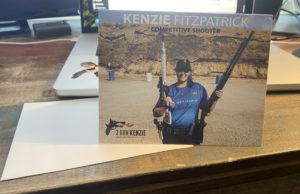
3GK Cards
Always say thank you to sponsors of any shooting competition you attend. A simple email or Facebook post goes a long way to showing your appreciation to a company for donating their money or product. I like to handwrite thank you cards to every company that sponsors an event. I try to write personally to people I know at the company, like the owner or representative that travels to matches on behalf of the company.
The best way to thank the sponsors is to do any of the items listed above! Tag them in a post, buy their product, share their social media posts, etc. The firearm industry is almost completely blocked from creating paid Google ads, Facebook & Instagram ads, YouTube ads, and more. So many of them rely on word of mouth to reach people organically.
9. Be a good person
How you treat other competitors, RO’s, Match Directors, and even spectators are critical. At the end of the day, this is just a game. RO’s are volunteers. Match Directors just spent weeks and months getting the match you just shot up and running. And those spectators may have lost interest in ever competing or joining because of what they just saw on the range. Be a good sport whether you win or lose.
- Chatting with Randy from Atlas
- Giving the Schmidt’s a Ride
- Catching up with my old friends!
- Sharing a meal with friends
If you remember nothing else, remember this: No matter who you meet on the range, you might be the very first person they’ve ever spoken to at a competition, asked a question of, or even met in the entire firearms industry. Try to put yourself in their shoes and remember your first encounter with firearms. A bad experience with you could tarnish their view of the firearms industry as a whole if gone poorly. Consider every stranger you meet an opportunity to show how amazing the shooting community is.
The age-old adage “treat others how you want to be treated” should be how you choose to live your life. Be a good person on and off the range, have a positive attitude, and build people around you.
10. Ask what more you can do and how to improve
Be open to feedback. Ask companies how you can do more for them or specific things you can do to help them grow. You should also ask for feedback on how to improve on social media or as a shooter. Shooting sponsorships can evolve as the industry and shooting sports change. Be open to trying new things and learning how to navigate new challenges.
How to Reach out to New Sponsors
When you go out asking for shooting sponsorships, make sure you’ve added value for each company you want to approach first.
Create a shooting resume

Volunteering with other locals to teach the next generation of shooters
The first thing you need to do is create a resume, yes, just like you would for a job. If you want to have shooting sponsorships, you need to show them you are serious. A shooting resume should include an introduction of yourself, any credentials you possess (NRA instructor, NROI RO/CRO, USCCA instructor, etc.), and list any current sponsors you have now. List any active certifications or education you have in the industry, such as an AR-15 armorer, Glock armorer, etc. Think about what you have done for the shooting industry and include that in your resume. Some examples are the number of new competitive shooters you’ve brought, how many articles you’ve published, any news features, or your RO or volunteer experience. List out the shooting disciplines and the divisions you currently compete in. If you’re first aid certified or medically trained, include that! If you don’t have any of these items, consider diving into the industry a little more and treating it as part of your professional journey.
Share accomplishments
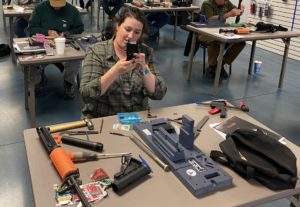
Learning how to be an AR-15 Armorer
Shooting sponsorships come in various ways, and one of them can be for placing at or towards the top of competitions regularly. Celebrate your accomplishments. Include titles you’ve won, podium places you’ve had, and any other recognitions in the industry on your shooting resume.
Keep a tracking sheet
Companies want to know your match schedule and where all city and state-wise you’ve traveled to. Create a spreadsheet with the name of the match, the dates of the competition, the location it will be held at, the number of competitors or level of the match, and where you placed. If you also RO’d the match, include that as well. If you’ve never done this, it can surprise you at the end of the year how much you have accomplished or completed without even realizing it. Provide this list or sheet to any potential sponsor to show them what all you have done in the past so far.
Send an email, make a call, set up a meeting

Teaching Firearms Classes
Please don’t DM a message to a brand asking for sponsorship. Or send a generic email to every company you know to ask for sponsorship. You wouldn’t believe how many messages a company receives with the same “will you sponsor me?” message. If you don’t have a connection with the company, it’s still possible to ask for a sponsorship. Still, if you’ve done a lot of the activities listed above, you have probably already made a contact who works at the company or know someone who can make an introduction for you.
Start by writing an email directed to a specific person if you know them, and make it personal. This should be genuine and not fluff, though; there’s a difference. List out your accomplishments and the matches you’ve attended in the last 12 months. Talk about what you are most looking forward to and what’s next for you now. Do you have future matches and events planned, and do you still intend to be consistent in traveling and shooting? Make sure to convey this message.

Being a guest on the DoubleStar USA podcast
Explain the value you would bring to the company, with real-life examples if you have them. Include the shooting resume you’ve created with the email for them to review.
Lastly, when making your ask of the company, ask them what they need and if they see value in what you have done for them thus far. Mention what sponsorship you are seeking, whether the product, financial, online exposure, and match costs. If you plan to attend an event in the future you know they will be at (Shot Show, NRA Annual, a Major Match), ask to sit down and have a meeting with them.
Shooting sponsorships should be a Win/Win relationship for both the shooter and the company.
How to Maintain Current Sponsor Relationships
Once a company sponsors you, your focus on working with them should not drop off to pursue others. Think of these relationships as marriage. They still want to be courted even after they’ve married.
Don’t assume
I never assume that one year’s sponsorship will roll over to the next. Just like shooters change divisions, in life and performance, companies change. Product lines change, companies move into new markets, and you may not fit their unique needs to grow as a company. You should want what’s best for the company long-term and never burn a bridge because you never know what could happen in the future.
Follow-through
Follow through with doing what you say you are going to do. You’ve committed, and you should honor it and then some. It doesn’t matter whether you have a gentlemen’s agreement or an official contract; you should always follow through on your word.
Provide an end of the year review
I always provide my sponsors with a review of my year’s events. I like to show what matches I attended, if I placed, where it was held, and share if I worked the match. I also mention my personal and professional accomplishments. When writing this, I’ve been five months into launching a podcast, have been nominated for the 2022 Gundie Awards, and recently published in USPSA magazine along with my continued online publications with Widener’s, Crossbreed Holsters, and AmericanFirearms.org. I share these with my sponsors and other milestones, accomplishments, or education I’ve received in the last year.
How to Determine Your Value & Negotiate
Understand your TRUE value
There are so many types of shooting sponsorships out there today and many that aren’t “real” sponsorships. There’s no governing law or body that dictates who can or cannot create a team or jersey, and for the most part, anyone can add any logo to their jersey.

Determining what value you bring to a company can be a challenge.
Many shooters either have an inflated outlook of their value and ask for unrealistic things that turn sponsors off or completely undervalue themselves and will eventually not be satisfied when they see it’s not a win-win situation. Be honest with yourself about what you think your value really and truly is, what work you have done, and what level of dedication you have to build the sponsor’s brand. Once you understand what your actual value is, set expectations of the sponsor for what you expect in return for your work and make sure it’s evident in any binding contract.
Don’t be afraid to negotiate
If you’ve ever been offered a job, you’ve probably received a salary amount with it. That first number you receive is often not the highest or collectively with benefits, not the most they would be willing to offer to hire you. Treat sponsorship negotiations the same way if you feel undervalued or under-rewarded in the initial contract. If you decide to negotiate a contract where payment in money or product is rewarded based on sales, insist that there is a transparent system to show both the shooter and sponsor where the sales are in real-time. Companies can use many affiliates and sales tracking systems to do this, so there’s no reason they can’t provide this information.
Conclusion
You should be grateful for any shooting sponsorships you receive, no matter how small or large they are. The companies who choose to sponsor you, believe in you, and put their trust in you. Remember that you reflect their brand in others’ eyes and vice versa. Make sure you believe in the same values they do, as people will judge you based on a company’s actions as well. And remember, always do more for them than you expect them to do for you.


